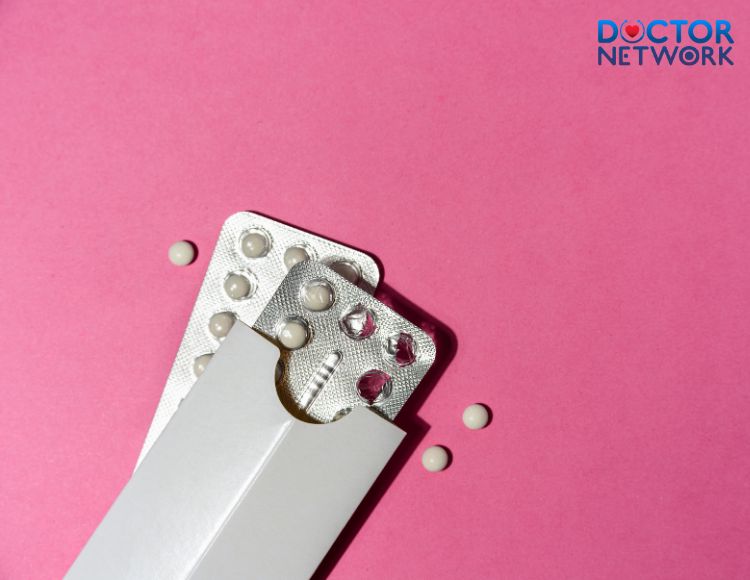Choosing a contraceptive method while breastfeeding is entirely reasonable for mothers. However, not all contraceptive pills are suitable during this period. This article provides information about breastfeeding contraceptive pills, answers common questions, and helps mothers make an appropriate choice after consulting with their doctor.
Postpartum Contraceptives: An Overview
Postpartum contraceptives are used to prevent unintended pregnancies after childbirth. Choosing the right contraceptive while breastfeeding is crucial to ensure the safety of both mother and baby.

Postpartum contraceptives are used to prevent unintended pregnancies after childbirth
Benefits of Breastfeeding Contraceptives Pills
- Effective pregnancy prevention – benefit of breastfeeding contraceptive pills
- Reduced risk of iron deficiency anemia (especially after childbirth)
- Potential improvement in irregular menstruation, menstrual cramps, etc.
Safe Contraceptives for Breastfeeding: Progestin-Only Pills (POPs)
Progestin-only pills (POPs) are the top recommended choice for breastfeeding mothers. These pills do not contain estrogen and work by thickening cervical mucus to prevent sperm from meeting the egg, and sometimes by inhibiting ovulation.
Dosage of Breastfeeding Contraceptives
Take one pill every day at the same time. It is important to take the pill consistently without interruption to ensure effectiveness.
Side Effects of Breastfeeding Contraceptives Pills
- Side effects of breastfeeding contraceptive pills – May cause breakthrough bleeding, irregular periods, or amenorrhea.
- Possible minor reduction in milk production: This is usually insignificant for most women and does not affect the baby’s growth.
- Other less common side effects: headaches, nausea, breast tenderness.
Expert Opinions
According to healthcare experts, choosing a suitable postpartum contraceptive method is extremely important, especially for breastfeeding women. Progestin-only pills (POPs) are a SAFE and EFFECTIVE choice for mothers during this period.

Progestin-only pills (POPs) are a SAFE and EFFECTIVE choice for mothers during this period
Reasons to Use POPs
- Safe for both mother and baby: POPs have been researched and proven safe for both mother and child. The amount of progestin in POPs is very low and does not affect the quality or quantity of breast milk.
- High contraceptive effectiveness: When used correctly, POPs are up to 99% effective in preventing pregnancy.
- Helps reduce the risk of postpartum anemia: POPs can help improve iron deficiency anemia, a common issue in postpartum women.
- Easy to use: POPs only require taking one pill daily at the same time.
Notes
- Consult your doctor before use: The doctor will assess your overall health and advise on the most suitable type of POP for you.
- Correct use: Take POPs consistently every day at the same time to ensure contraceptive effectiveness.
- Monitor side effects: Some women may experience side effects like changes in menstruation, headaches, etc. However, these side effects are usually mild and resolve over time.
Safe Contraception While Breastfeeding
Timing for Using Breastfeeding Contraceptives:
You can start using them from 6 weeks postpartum, depending on your doctor’s guidance.
Consult a Doctor for Breastfeeding Contraceptives:
Provide your medical history to your doctor to choose the most suitable contraceptive.

Provide your medical history to your doctor to choose the most suitable contraceptive
Daily Breastfeeding Contraceptives:
These are the most commonly recommended type.
Emergency Contraceptives:
Some types can be used if necessary. Consult your doctor or pharmacist for the best advice.
Frequently Asked Questions (FAQ) about breastfeeding contraceptive pills
- Do contraceptive pills affect breast milk?
- Progestin-only pills minimally affect the quality and quantity of breast milk. The benefits of contraception usually outweigh this risk.
- Is it necessary to stop breastfeeding when taking contraceptive pills?
- Generally, it is not necessary in most cases.
- Alternative contraceptive methods if not taking pills?
- Options include IUDs, contraceptive implants, sterilization, etc. (consult your doctor).
- Does taking contraceptive pills affect the baby?
- The amount of progestin in progestin-only pills (POPs) that passes into breast milk is very small and does not harm the baby. Some studies show that babies breastfed by mothers taking POPs grow well and are healthy.
Scientific Evidence on Breastfeeding Contraceptives Pills
- Etude et Cohorte sur la Contraception et le SIDA (ECCS): A large study in France found that POPs are 99% effective in preventing pregnancy with perfect use and 98% with typical use.
- American College of Obstetricians and Gynecologists (ACOG): ACOG supports the use of POPs for breastfeeding women, stating that “there is no evidence that POPs harm infants.”
- La Leche League International (LLLI): A major study found that POPs do not significantly reduce milk supply in breastfeeding women.
- Centers for Disease Control and Prevention (CDC): The CDC notes that POPs may offer additional health benefits for breastfeeding women, such as reducing the risk of iron deficiency anemia.
Progestin-only contraceptive pills are a safe and effective choice for breastfeeding mothers. Always consult your doctor before starting any breastfeeding contraceptive pills to assess your specific health condition and get advice on the most suitable medication.
References:
Kiểm Duyệt Nội Dung
More than 10 years of marketing communications experience in the medical and health field.
Successfully deployed marketing communication activities, content development and social networking channels for hospital partners, clinics, doctors and medical professionals across the country.
More than 6 years of experience in organizing and producing leading prestigious medical programs in Vietnam, in collaboration with Ho Chi Minh City Television (HTV). Typical programs include Nhật Ký Blouse Trắng, Bác Sĩ Nói Gì, Alo Bác Sĩ Nghe, Nhật Ký Hạnh Phúc, Vui Khỏe Cùng Con, Bác Sỹ Mẹ, v.v.
Comprehensive cooperation with hundreds of hospitals and clinics, thousands of doctors and medical experts to join hands in building a medical content and service platform on the Doctor Network application.

























